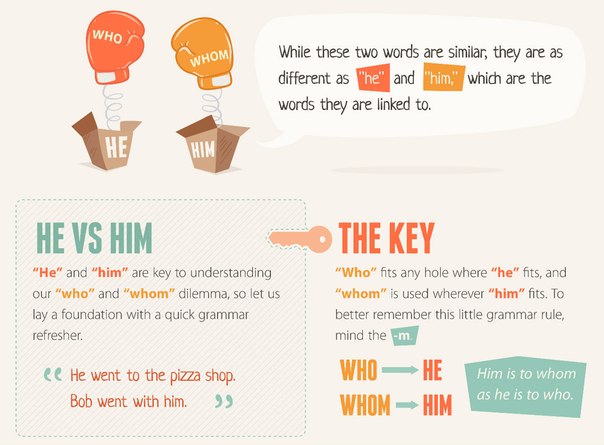
Who vs Whom
The word “who” is often incorrectly used where “whom” is appropriate, and people seem to avoid “whom” in spoken English completely, but “whom” does have a specific purpose. While these two words are similar, they are as different as “he” and “him,” which are the words they are linked to.
He vs Him
“He” and “him” are key to understanding our “who” and “whom” dilemma, so let us lay a foundation with a quick grammar refresher.
He went to the pizza shop.
Bob went with him.
He also took the dog with him.
When he got there, a duck was in the parking space he wanted, but it did not stress him, and he parked elsewhere.
The Key
“Who” fits any hole where “he” fits, and “whom” is used wherever “him” fits. To better remember this little grammar rule, mind the -m. Him is to whom as he is to who. If necessary, move the words around to feel the sentence out.
Who or Whom ate my pizza?
Change it to a statement: “He ate my pizza.” The correct sentence: “Who ate my pizza?”
With who or whom did you eat the pizza?
Bob surely helped to eat that pizza, so move the words around. “The pizza was eaten with him.” “Whom” is used where “him” fits (there is that -m), so “With whom did you eat the pizza?” is the solution.
Memory Tip and Quiz
Try some for yourself, and mind that -m!
1. For who or whom is this pizza party being held?
2. Who or whom ordered one with peppers?
3. Who or whom is taking leftovers home?
4. Who or whom wanted extra onions, and with who or whom is that person riding home?
Answers
1. Him; “For whom is this pizza party being held?”
2. He; “Who ordered one with peppers?”
3. He; “Who is taking leftovers home?”
4. He and him; “Who wanted extra onions, and with whom is that person riding home?”
Plurals and Possessives
“They” and “them” are the plurals of “he” and “him.” They work the same way, and you can still count on the -m to help you out. “Who” links to “they,” and “whom” links to “them.”
Who or Whom is still at the party?
For who or whom are all these party hats?
“They” are still at the party, so “Who is still at the party?” The hats are for “them,” so “For whom are all these party hats?”
The possessive form of “who” and “whom” is a cinch; there is only one, and it is universal: “whose.” The only issue with “whose” is a tendency to confuse it with “who’s,” which is a contraction of “who” and “is.”
Whose dog is eating the bread sticks, and who’s not getting any leftovers to take with them?